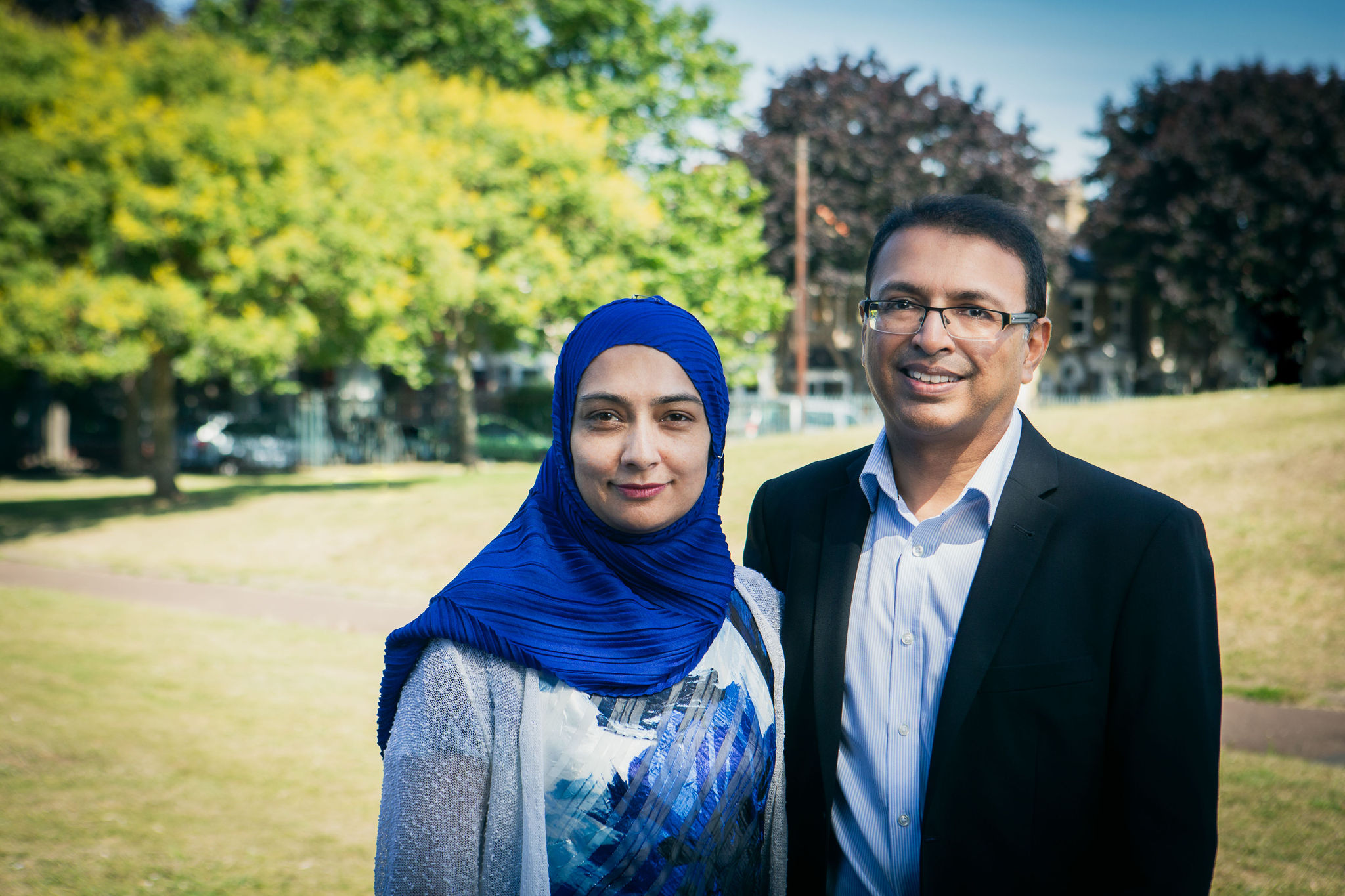A modern professional relationship
In Insight
Follow this topic
Bookmark
Record learning outcomes
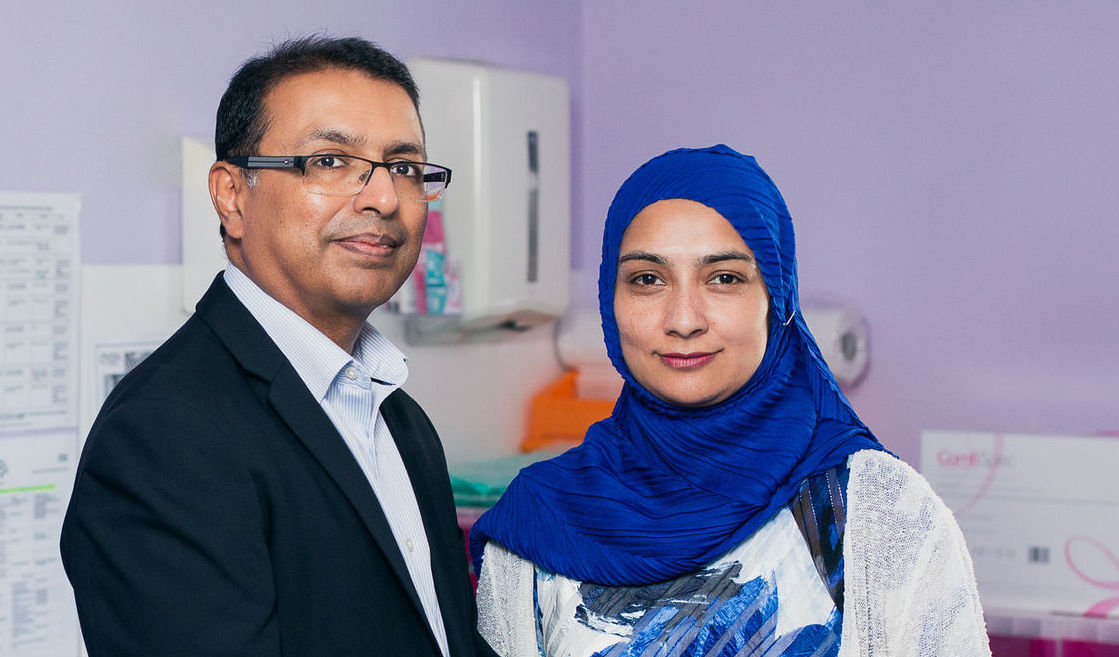
Community pharmacists and general practitioners often co-exist in an uneasy truce. As pharmacists think about how they might fit into primary care networks (PCNs) and integrated care pathways, Rob Darracott went to Newham in East London to talk to two pioneering clinicians about their local partnership, and to find out why it’s a live example of the NHS Collaborate philosophy in action.
This is clearly a professional partnership that works on a very personal level. We meet in the consultation room of Jignesh Patel’s Rohpharm Pharmacy, just across the street from the Plaistow District Line underground station. The Project Surgery, where Dr Farzana Hussain is a single-handed GP principal, is just around the corner, less than five minutes’ walk away. As photographer Krystian organises poses, they chat to each other, about work, about the community, about Jignesh’s upcoming holiday. When we get started on what makes them tick as clinicians with a shared population, they almost finish each other’s sentences.
They have known each other professionally for more than 15 years, since the Project Surgery opened in 2003, but it was a crisis that brought them more closely together, and that led to the collaboration they have today.
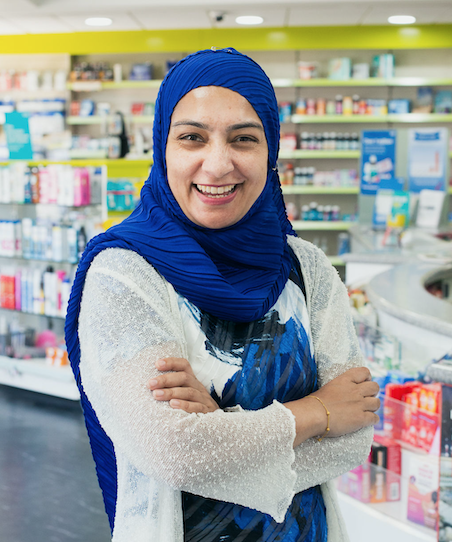 Farzana tells the story. “Five and a half years ago my partner Peter passed away suddenly. At the time I was the only GP in the surgery. It was November in the middle of the flu epidemic. My salaried doctor was on maternity leave, and I simply did not have enough appointments for 4,500 patients on my own.
Farzana tells the story. “Five and a half years ago my partner Peter passed away suddenly. At the time I was the only GP in the surgery. It was November in the middle of the flu epidemic. My salaried doctor was on maternity leave, and I simply did not have enough appointments for 4,500 patients on my own.
“I had known Jignesh well as a very safe community pharmacist who I would come to for advice. I really trusted his clinical work, I liked him as a person, we had grown a friendship although we never had time to see each other out of work. I know his family. It was a very trusting relationship. And Jignesh said to me ‘why don’t you send the patients that you can’t give an appointment to to me and if I have any issues, I’ll let you know’. And because I trusted Jignesh’s clinical work I felt safe enough to do that. It opened a whole door for me to think how much general practice work can be managed by a community pharmacist.”
That was the start of a different kind of GP/pharmacist relationship, and now Farzana and Jignesh are in the forefront of local delivery. “We have a local extended primary care service, like a daughter of QOF [GP’s Quality Outcomes Framework], to prevent pre-TB, we’re one of the UK’s hotspots for latent tuberculosis. The service is designed for pharmacy and GP working with shared IT.” Jignesh wrote the pharmacy SOP for the service.
An award-winning service redesign
The innovative scheme won Newham Clinical Commissioning Group the 2018 Health Service Journal Award for community or primary care service redesign. More than 5,600 patients were screened by the 51 GP practices in Newham between April 2016 and March 2018, with 375 patients agreeing to start treatment through one of 16 CCG-accredited pharmacies.
That’s not all. “We saved six hours of GP time a week by diverting patients to our local commissioned minor ailments scheme, particularly through hay fever in the summer months,” Farzana says, adding that she captured the lessons in a YouTube video diary for the NHS’s Sustainable Improvement Team. “The hardest part is convincing patients that pharmacists give just as good a service, but I knew, and the patients knew that if there was any problems Jignesh would be able to contact the surgery. It’s brought us closer together.” She says that as PCNs get up and running, trusted relationships are going to be key. As clinical director of the newly formed Newham PCN, Farzana will be looking to build on her experience.
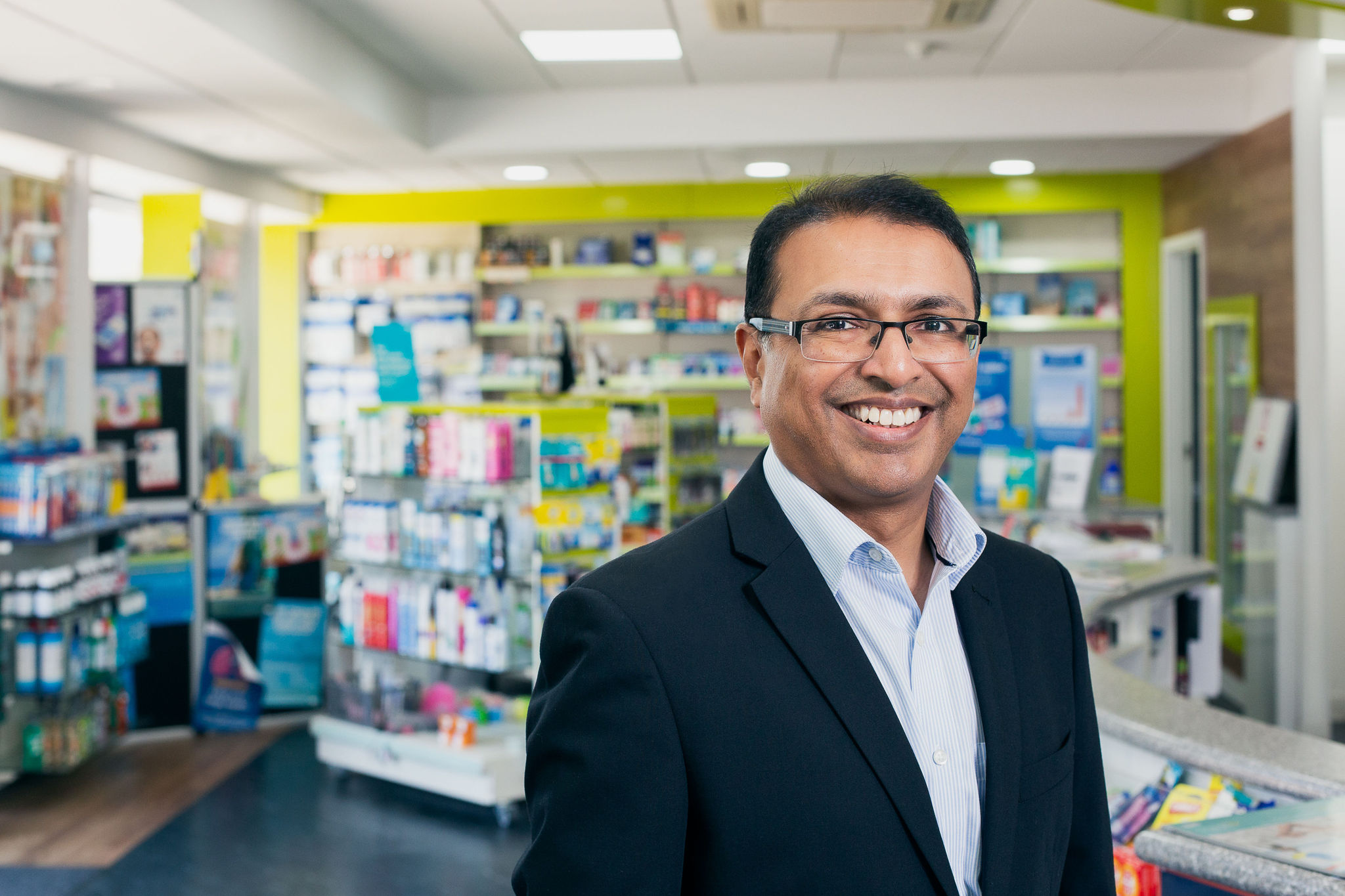 Jignesh’s perspective is an echo of Farzana’s. He says: “I started in community pharmacy in 1988 and for 10 years that was all I did. It was about 2000 when I joined the LPC and first started looking at service redesign. Newham was one of the pilot sites for smoking cessation. We did minor ailments. We were one of the first places to do NHS health checks. These were all developments in collaboration with the Primary Care Trust.
Jignesh’s perspective is an echo of Farzana’s. He says: “I started in community pharmacy in 1988 and for 10 years that was all I did. It was about 2000 when I joined the LPC and first started looking at service redesign. Newham was one of the pilot sites for smoking cessation. We did minor ailments. We were one of the first places to do NHS health checks. These were all developments in collaboration with the Primary Care Trust.
“I believe we can support GPs by giving patients access, and a choice in terms of prevention and treatment of minor ailments.” He says that until 2013 the lack of IT links to practices made it difficult to expand the range of services. They have been piloting EMIS Web for a couple of years. “When I do medicines reviews, they are not just simple medicines reviews. Because I have EMIS I can look at how people are progressing, I can look at their bloods, see if they have issues with compliance.” He says that, as a result, and unlike other pharmacies in Newham, his referrals and interventions in the latent TB scheme go automatically to Farzana in the practice.
“Everyone is swamped with workload, GPs, pharmacists, hospitals. How do we all work together to ensure we don’t duplicate, to make sure patients have wider access? We’ve looked at spirometry, we’ve looked at the review of asthma patients. In the latent TB scheme the monitoring and check-up occurs through the pharmacy.”
GPs and pharmacists working together
I ask whether Jignesh and Farzana’s experience might form the basis for how GPs and pharmacists will work together in the new form of primary care being developed as part of the NHS Long Term Plan. Farzana says that their strength is their relationship: “I don’t think either of us would lie to you and say that all GPs or community pharmacists were going to do this. We get into tribes to protect money and workload and there is too much work for not enough money. But if we put our defences down a little, is there something we can do differently?
“It was the National Association of Primary Care (NAPC) that taught me about reciprocity. What can I give my community pharmacy, instead of it always being what can you give me? That’s quite a hard thing for human beings because we are born to survive, but if we can flip it, you will get something back – at least that’s what happens to me.
“The thing we are missing is that while these all singing, all dancing, clinical pharmacists are going to be great in practice, community pharmacists have been consulting with clients for years. Patients say, ‘even though the doctor says, I just like to check with my pharmacist’. When we say, ‘it’s only the GPs that have continuity’ that’s claptrap, it’s just us defending ourselves. People know when pharmacists are open too – later than the surgery weekdays, and on Saturday. This is about the service to our patients; it’s not about me.”
The pair clearly have something special; but the genesis of their close working five or so years ago closely resonates with the philosophy of NHS Collaborate (further information here). Farzana found the network through her close interest in working with community pharmacy. “I met Collaborate at an NAPC event which I went to specifically because it was a joint pharmacy day,” she says. “Mark Spencer [one of Collaborate’s GP founders] was on my table; we were just chatting, I’m from Preston, he’s from Fleetwood, and he said, ‘you know Farzana, you should think about joining Collaborate, it’s a leadership organisation’. I’d only met him 45 minutes earlier. He saw my hesitation and he said ‘anybody who wants to make a change is a leader’. I said: ‘I want to make a change’. I didn’t know people like that existed in the NHS. They have given me the courage to think ‘yes, I am a jobbing GP, but my voice counts too’.”
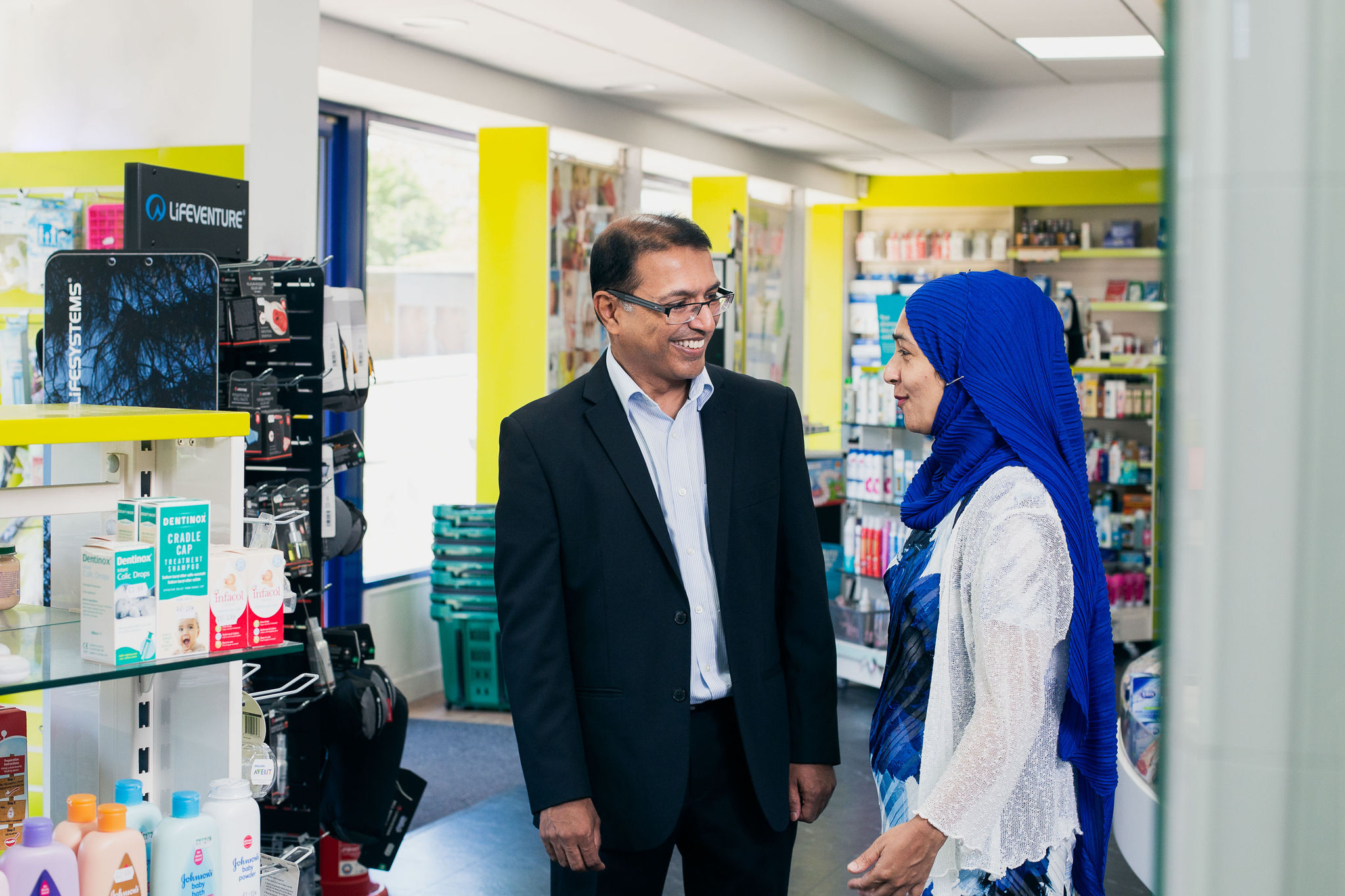 A network of like-minded clinical leaders from across the professions appeals. Farzana is a regular contributor to the group’s social media, and started an NHS Collaborate Connect group in Newham last November, bringing together GPs, pharmacists, patients, students, teachers and CCG members to reflect on what good looks like. She invited Mark Spencer to kick things off. Of course, Jignesh was there too.
A network of like-minded clinical leaders from across the professions appeals. Farzana is a regular contributor to the group’s social media, and started an NHS Collaborate Connect group in Newham last November, bringing together GPs, pharmacists, patients, students, teachers and CCG members to reflect on what good looks like. She invited Mark Spencer to kick things off. Of course, Jignesh was there too.
“Collaborate is the one place where I can be myself and people will work with me as I am,” she says, adding that the pillars that form the leadership framework of Collaborate could be just the thing to bring people together to talk about doing better things. “If Collaborate’s philosophy was ever needed, it’s needed now.
“The listening without judgement. The trust, it’s being able to share vulnerability, which I think is the hardest. Nobody wants to say, ‘I’m having a really crap day’. Everybody’s ‘I’m just alright’ when really you’re not alright. People don’t have permission to say that; I think I do. Jignesh has seen me literally on the floor with my partner just passed away – there’s not that many people I would have been able to do that with. If someone can see through the really dark times, then for me that’s the real strength of Collaborate. You can be absolutely yourself, and suddenly the best comes out of you. You get the courage to say something in a meeting you wouldn’t normally say.”
Jignesh agrees. “I believe Collaborate could be one way to make sure that pharmacists can get access and improve services,” he says. “You have to start with people you can trust, which is what me and Farzana have done. We have mentored each other’s registrars and pre-reg’s. When I did my independent prescribing we used GPs to teach us the skills required to make assessments and prescribing decisions. You can have all the clinical training there is, but if you haven’t had the mentoring…”
The growth mindset
“There is something about working with the willing,” Farzana interjects. “Helen Bevan [formerly the chief of service transformation at the NHS Institute] talks about ‘growth mindsets’. I am with someone who wants to grow, and isn’t just seeing his pharmacy. I want to grow. In Newham we have a lot of single-handed GPs and a third are due for retirement, and maybe they trained a little bit differently and hierarchy is important, but you don’t have to lose that. Jignesh is very respectful of me being a GP, but I am very respectful of him being a pharmacist.”
In addition to their work, cheek by jowl, in Plaistow, they are taking their experience out. “We got fantastic feedback when we did a primary care educator’s conference together,” Farzana says. “We didn’t need to rehearse, that’s the thing about relationships. If I pause on something, then Jignesh will know ‘I need to go in and help her’.” They have also collaborated on two videos for the Wessex Academic Health Science Network detailing the benefits of electronic repeat dispensing (eRD).
“We talk about knowledge, skills, and approach – I don’t like the word attitude – and approach is the most important. We spend all our time in educational settings teaching knowledge, which is the easy bit. But you can only have the right approach if someone trusts you.”
She contrasts that with the experience of clinical pharmacists put into practices by the local GP federation. “They’ve stuck them in, with the wrong job, with no respect. Surprise, surprise, they’ve gone. Were the pharmacists not right, or did we not have the support structure in the first place? It’s more than just go on the course.” She clearly intends to do things differently as the PCN clinical director. The first network meeting was on 1 August. All GPs and community pharmacists were invited.
Jignesh agrees a different approach is needed. I remind him that I’d seen him at a pharmacy conference being very dismissive of what he was hearing from the platform. “When I saw that presentation, I thought: ‘this will fall flat on its face because GPs are not going to engage’. They will be thinking, what is the community pharmacist going to give me that is different to the pharmacist in the practice?
“Doing things in silos is not going to get you where you want to be. We need people nationally to think differently before we all jump in to get more qualifications. You need to build relationships first. Every PCN is going to be different. One size fits all is not going to work.” He says he’s not alone. There are groups of pharmacists around who want something different, who are not necessarily aligned with the existing professional structures.
He thinks pharmacy needs a shot of Collaborate. “We need a group of pharmacist leaders who speak and do the Collaborate thing,” he says. That means a different type of leadership, and not just for the different professions in primary care. “It’s not just Farzana; her whole team is the same. It’s about having the infrastructure in place, so if an individual is not there, the whole thing doesn’t fall apart.”
“I had a nine and a 10-year-old when Peter died,” Farzana says. “I don’t think my surgery would be open today if Jignesh had not been here.”
